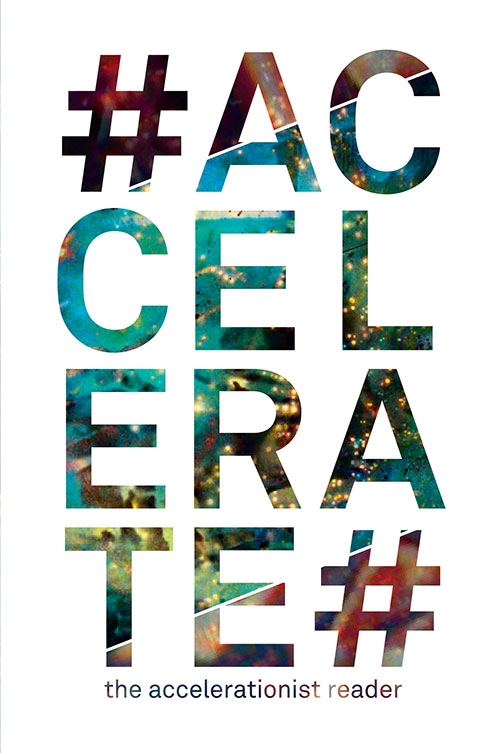It’s a preoccupation of current political debates that while we find ourselves in an era when the forces of capitalism appear all-powerful and unstoppable, the left seems incapable of anything other than a backward-looking nostalgia. This absence of an inspiring vision of the future has begun to throw up some interesting responses, not least the publication last year of Alex Williams and Nick Srnicek’s ‘Manifesto for an Accelerationist Politics’ (MAP), the text at the core of #Accelerate’s engaging, eccentric anthology of feral philosophy, which assembles a sort of historical backstory to what its editors, Alex Williams and Arman Avanessian, term the ‘political heresy’ of ‘accelerationism’. Rather than ‘protest, disrupt or critique capitalism’, they argue, the only radical response is to ‘accelerate its uprooting, alienating, decoding, abstractive tendencies’, while adopting a ‘politically and theoretically progressive attitude towards its constituent elements’.
In #Accelerate, this tends to mean a fierce, often giddy assertion that the disruptive, expansionist drive of capitalism points us to a future convergence of technological and economic systems that will eventually encompass the whole world. Rather than retreat into a ‘folk politics of localism, direct action and relentless horizontalism’, MAP wants to push beyond capitalism’s limits, to ‘unleash latent productive forces’ in which the material platform of neoliberalism is not destroyed but ‘repurposed towards common ends’. It’s refreshing to encounter a ‘left’ project for the future that wants to reclaim the idea of technology, industry and planet-scale thinking, when most of the left nowadays subscribes to eco-pessimist anxieties about too-much and too-fast. Still, while accelerationism is upbeat about advanced technological society, it’s also a philosophical vision that tends to challenge what it means to be human; hence the intense focus of many of the writers on the primacy of machines and of ‘machinic intelligence’.
many of the texts struggle with the problem of whether human agency can still operate politically – whether the will, desires and wishes of human beings can ever really decisively shape society
For Mackay and Avanessian, the roots of accelerationism can be found in Marx’s prophetic speculations about the displacement of human labour by machines, and the increasing integration of humans into the big machine of capitalism, a line they trace forward to the shrill, borderline-hysterical theorising of French poststructuralists in the wake of the failed revolutionary moment of May 1968. Gilles Deleuze and Félix Guattari’s 1972 Anti-Oedipus is extracted here, but it’s Jean-Francois Lyotard’s 1974 Libidinal Economy that is the dark star of the middle section of essays: reading Lyotard’s infamous line ‘that one can enjoy swallowing the shit of capital, its materials, its metal bars, its polystyrene, its books, its sausage pâtés, swallowing tonnes of it till you burst’, you can see how it sets the tone for a generation of political theorists who largely gave up on the working class as the force that might overthrow capitalism – we’re too busy enjoying consumerism to do any revolting.
Lyotard’s disillusion was prophetic, in a bad way – if one thing marks out leftists and greens today, it’s their antipathy towards material prosperity (too much of everything), and towards the dumb, brainwashed consumers (us) who keep the big machine going. #Accelerate can’t quite rid itself of this too-common ‘radical’ prejudice. Following the mostly French texts of the 1970s, it devotes an entire section to the oracular rantings of philosopher Nick Land and his partner Sadie Plant, who in the 1990s fused Continental theory with cyberculture to conclude that capital had become a kind of self-willed techno-cosmic process set to supersede its increasingly obsolete human components.
While #Accelerate tries to distance itself from Land’s imperiously batty posthumanism, many of the texts struggle with the problem of whether human agency can still operate politically – whether the will, desires and wishes of human beings can ever really decisively shape society. Even the best of the contemporary texts, Reza Negarestani’s ‘Labour of the Inhuman’ and Ray Brassier’s excellent essay in defence of ‘Prometheanism’, can’t quite explain who the future is going to be for. It’s all third-person and passive tense. Sure, we know that to have an idea of the future, ‘what there is’ needs to turn into ‘what could be’, or even ‘what ought to be’. What’s missing from accelerationism is the confidence that humans might be capable of deciding what we want the future to be.
This article was first published in the September 2014 issue
